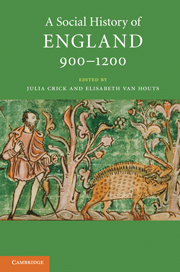Book contents
- Frontmatter
- Contents
- List of figures
- List of maps and tables
- List of contributors
- Acknowledgements
- List of abbreviations
- Map 1 England and its neighbours
- Map 2 England 900–1200
- I Introduction
- I.1 Land use and people
- I.2 Water and land
- I.3 Forest and upland
- I.4 Mineral resources
- I.5 Health and disease
- II.1 Authority and community
- II.2 Lordship and labour
- II.3 Order and justice
- II.4 War and violence
- II.5 Family, marriage, kinship
- II.6 Poor and powerless
- III.1 Towns and their hinterlands
- III.2 Commerce and markets
- III.3 Urban planning
- III.4 Urban populations and associations
- IV.1 Invasion and migration
- IV.2 Ethnicity and acculturation
- IV.3 Intermarriage
- IV.4 The Jews
- V.1 Religion and belief
- V.2 Rites of passage and pastoral care
- V.3 Saints and cults
- V.4 Public spectacle
- V.5 Textual communities (Latin)
- V.6 Textual communities (vernacular)
- VI.1 Learning and training
- VI.2 Information and its retrieval
- VI.3 Esoteric knowledge
- VI.4 Medical practice and theory
- VI.5 Subversion
- Glossary
- Time line 900–1200
- Further reading
- Index
VI.5 - Subversion
Published online by Cambridge University Press: 05 June 2012
- Frontmatter
- Contents
- List of figures
- List of maps and tables
- List of contributors
- Acknowledgements
- List of abbreviations
- Map 1 England and its neighbours
- Map 2 England 900–1200
- I Introduction
- I.1 Land use and people
- I.2 Water and land
- I.3 Forest and upland
- I.4 Mineral resources
- I.5 Health and disease
- II.1 Authority and community
- II.2 Lordship and labour
- II.3 Order and justice
- II.4 War and violence
- II.5 Family, marriage, kinship
- II.6 Poor and powerless
- III.1 Towns and their hinterlands
- III.2 Commerce and markets
- III.3 Urban planning
- III.4 Urban populations and associations
- IV.1 Invasion and migration
- IV.2 Ethnicity and acculturation
- IV.3 Intermarriage
- IV.4 The Jews
- V.1 Religion and belief
- V.2 Rites of passage and pastoral care
- V.3 Saints and cults
- V.4 Public spectacle
- V.5 Textual communities (Latin)
- V.6 Textual communities (vernacular)
- VI.1 Learning and training
- VI.2 Information and its retrieval
- VI.3 Esoteric knowledge
- VI.4 Medical practice and theory
- VI.5 Subversion
- Glossary
- Time line 900–1200
- Further reading
- Index
Summary
A tension between spiritual joy and earthly pleasures was a hallmark of the period in question, as it was of many other periods of history. On the whole, the ‘official’ culture of the Church regarded levity, eating, drinking and the enjoyment of the body, particularly the unruly and potentially immoral lower body, as profane and ungodly. These austere religious authorities shared an uneasy coexistence with more worldly forces, inside the Church as well as outside, which relished earthly delights, indulged the lower body and celebrated these exploits without shame. Occasionally such profane behaviour was purposefully blasphemous; at other times it was designed as satire, reproof for the abuses and hypocrisies of the Church and the age. Perhaps most often it was merely the product of high spirits, though those high spirits were commonly regarded as an offence to the dignity of the Church.
The period before 1200 recorded less frivolity, profanity and licence than later centuries, but this is indubitably an effect of limited literacy and the sombre bias of the written records. The situation of the modern scholar is much like that of Gerald of Wales, who described a dinner at Canterbury Cathedral Priory in 1180. Enjoined to solemnity, the monks were supposed to be keeping silence, but Gerald observed that in practice they were irrepressibly lively.
- Type
- Chapter
- Information
- A Social History of England, 900–1200 , pp. 402 - 411Publisher: Cambridge University PressPrint publication year: 2011



